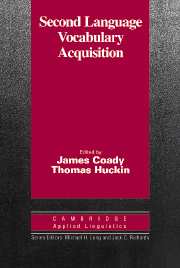Book contents
- Frontmatter
- Contents
- List of contributors
- Series editors' preface
- Acknowledgments
- I SETTING THE STAGE
- II CASE STUDIES
- III EMPIRICAL RESEARCH
- IV PEDAGOGY
- Chapter 10 Mnemonic methods in foreign language vocabulary learning: Theoretical considerations and pedagogical implications
- Chapter 11 L2 vocabulary acquisition through extensive reading
- Chapter 12 Teaching vocabulary
- Chapter 13 Pedagogical implications of the lexical approach
- V SUMMING UP
- Author index
- Subject index
Chapter 10 - Mnemonic methods in foreign language vocabulary learning: Theoretical considerations and pedagogical implications
Published online by Cambridge University Press: 05 October 2012
- Frontmatter
- Contents
- List of contributors
- Series editors' preface
- Acknowledgments
- I SETTING THE STAGE
- II CASE STUDIES
- III EMPIRICAL RESEARCH
- IV PEDAGOGY
- Chapter 10 Mnemonic methods in foreign language vocabulary learning: Theoretical considerations and pedagogical implications
- Chapter 11 L2 vocabulary acquisition through extensive reading
- Chapter 12 Teaching vocabulary
- Chapter 13 Pedagogical implications of the lexical approach
- V SUMMING UP
- Author index
- Subject index
Summary
Introduction
I would like to begin this chapter with a personal experience, one that will probably be recognized by many readers as familiar. English is a foreign language for me. (Throughout this chapter, I will use the abbreviation L2 both for second and for foreign language.) I consider myself an advanced learner of that language. I receive great amounts of input in written form (professional literature) and oral form (radio, TV), but almost every day I read or hear some unfamiliar words. When I deem a new word important, I first make an attempt to infer its meaning from the context, I then look it up in my dictionary in order to check my inference, and finally I write the word down in a notebook, together with its context. Yet, I tend to forget the meaning of most of the words thus processed soon afterward. The next time I come across one of them, I remember having seen it and looked it up, I sometimes remember the context in which it originally appeared, but I cannot retrieve its meaning. I feel very annoyed, consult my dictionary once again, but take no further measures in order to better anchor the word in memory.
Why is it that I couldn't remember the word's meaning the second time? What was wrong with my infer + look up + write down strategy? The most likely answer to these questions is that I might have done enough for immediate comprehension but not enough for retention over time. More precisely, I had not done enough to firmly link the word's form with its meaning.
Information
- Type
- Chapter
- Information
- Second Language Vocabulary AcquisitionA Rationale for Pedagogy, pp. 203 - 224Publisher: Cambridge University PressPrint publication year: 1996
Accessibility standard: Unknown
Why this information is here
This section outlines the accessibility features of this content - including support for screen readers, full keyboard navigation and high-contrast display options. This may not be relevant for you.Accessibility Information
- 11
- Cited by
